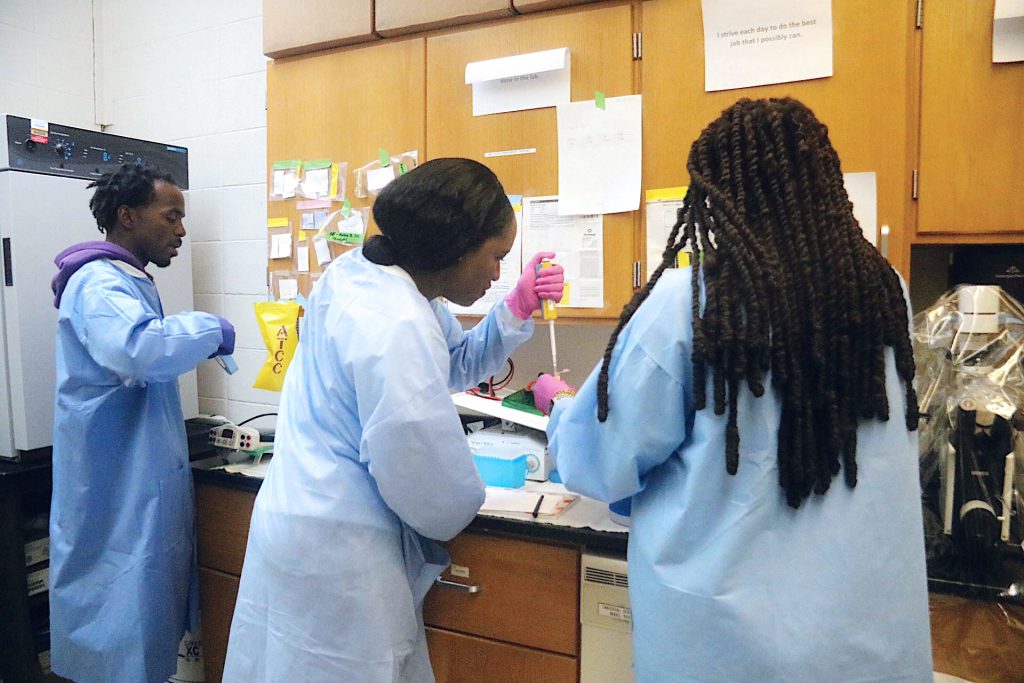
Cancer doesn’t have to be cured if it can be stopped.
That’s the approach Grambling State University Biology Professor Dr. Waneene C. Dorsey and a team of her students are taking with research they are currently conducting.
And that research has resulted in a $670,204, three-year National Science Foundation grant being awarded to Grambling State University (GSU) and Dorsey along with a team from Southern University Baton Rouge.
The objective of the joint research grant being done during the fall semester is to prepare underrepresented minority students from Historically Black Colleges and Universities (HBCUs) to pursue graduate studies in the Environmental Toxicology Ph.D. program at SUBR.
Or to be more precise, they’re doing research to utilize in the war against cancer.
“We are not attempting to cure cancer, rather, we are attempting to stop cancer,” Dorsey said.
GSU’s team of Georrein Dupree, Shamara Telemacque, Tatum Simmons, and Leiland Lovell are biology students who work with Dorsey in the Molecular Toxicology Research Laboratory at GSU.
Late last month Dorsey and the research team visited Southern University to study the advanced laboratory methods with Environmental Toxicology Ph.D. students at SU, who trained the GSU students in some of the more advanced methods.
“Our research at GSU involves identifying autophagy genes that cause cancer cells to thrive,” Dorsey said. “Once these genes have been probed and identified, we will use various chemicals to stop their gene expression by blocking them with certain chemicals. These chemicals now become potential anticancer medicines.”
The GSU students will receive $6,000 for a summer internship at Southern, which will include a stipend plus room and board.
“I’ve been working on this ever since I got out of school myself,” Dorsey said. “One of the things we are trying to do is to take our students and train them as research scientists. Medical school isn’t for everyone, and it’s the Ph.Ds that teach the med students their first two years in medical school. You can earn a Ph.D. and walk right into medical school without taking the MCAT (Medical College Admission Test).”
“And remember, it’s Ph.Ds that created the vaccines that found ways to stop COVID,” Dr. Dorsey continued. “They’re doing some of these same kinds of things we’re doing trying to find ways to stop cancer.”
Dorsey said earning a role as a member of the selected team of biology students provides an open pathway to the future.
“I sent out a net message to junior biology students asking them what they wanted to do with their degree,” Dorsey said. “Being on the team includes a stipend of $500 per month. A lot of them hit me back saying they were going to be a pediatrician or an obstetrician or dentist.”
“But the beauty of this program is that these students are able to do things like get an internship at Southern. And that means they become potential students to usher through the Ph.D. program [there]. Many programs are starving for students. Especially African American students.”
Dorsey also conducted a program on the cancer research being done at GSU earlier this semester at the Biomedical Research and Industry Day, on Oct. 20, at LSU-Shreveport.
“We’re proud of this team, this program, and what these students are accomplishing,” Dorsey said. “And what kind of work could be more important than finding a way to stop cancer? These students are working on creating better futures for not only themselves but everyone in the world who is and has been affected by cancer. And there’s not too many who haven’t, so that’s a goal to be proud of — the students, and Grambling State University as a whole.”

